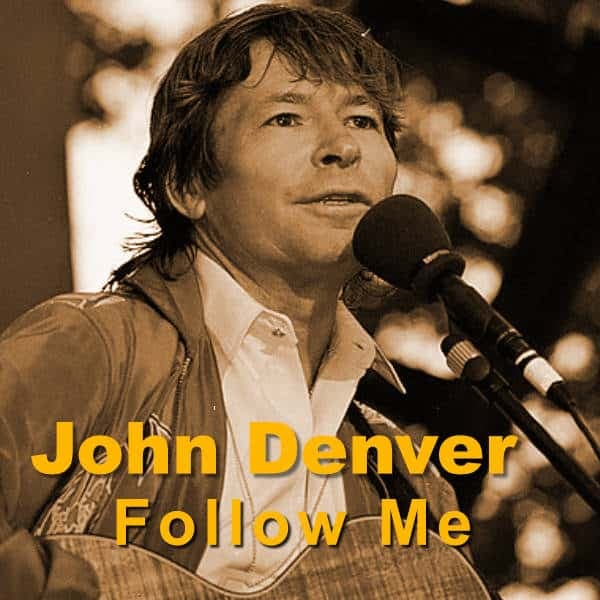
A simple, earnest plea for eternal companionship and shared experience.
For those of us who came of age with the gentle, soaring tenor of John Denver as the soundtrack to our lives, certain songs are more than mere melodies—they are emotional markers, touchstones for moments of deep feeling. Among the earliest and most beautifully understated of these gems is “Follow Me,” a track that first appeared as the B-side to the single “Isabel” released in March 1970, and was included on his second album, Take Me To Tomorrow, later that year.
Surprisingly, “Follow Me” did not achieve significant chart success upon its initial single release, especially when compared to the seismic impact of later hits like “Take Me Home, Country Roads” or “Sunshine on My Shoulders.” This lack of immediate commercial attention on the charts for the single doesn’t diminish its lasting emotional resonance. Its quiet, unassuming beauty, however, ensured its place on the essential 1973 compilation, John Denver’s Greatest Hits, where it found a much wider and more appreciative audience, cementing its status as one of his quintessential early works.
The Story and The Heartfelt Meaning
The story behind “Follow Me” is intimately tied to the beginning of John Denver’s adult life and romantic journey. Penned early in his career, the song is a direct and vulnerable love letter, written by the young singer-songwriter (then still Henry John Deutschendorf Jr.) to his first wife, Annie Martell. The lyrics lay bare the profound vulnerability of asking a life partner to commit not just to a person, but to a shared destiny, particularly for an itinerant artist just beginning to find his footing.
The core meaning of “Follow Me” is a beautiful distillation of an artist’s yearning for a complete, all-encompassing bond. The refrain—“Follow me where I go, what I do, who I know / Make it part of you to be a part of me”—is not a demand for subservience, but an almost desperately honest request for fusion. It speaks to the unique loneliness of the creative soul, even one who would become as globally beloved as John Denver. The opening lines, “It’s by far the hardest thing I’ve ever done / To be so in love with you and so alone,” perfectly encapsulate this duality: the ecstatic joy of profound love paired with the fear that his complex, constantly moving life might isolate him from the one person who could make him feel “at home.”
The song is an offer to share everything—the sights he’s seen, the places he’s going, the entirety of his life’s path. In a beautifully simple, circular logic, he promises that by following him, they will “never be alone” and “all the time that you’re with me / We will be at home.” The ultimate destination isn’t a physical place; it’s the constant, reassuring presence of the beloved.
A Nostalgic Reflection
Listening to the delicate acoustic guitar work and the pure, unvarnished quality of Denver’s early vocal delivery now, we are transported back to a simpler time, a period of greater innocence and hope, both personally and culturally. The early 1970s were a time when such earnest, folk-rooted sentiment could capture the hearts of millions. This wasn’t slick pop; it was poetry set to music, a quiet conversation that felt deeply personal, yet somehow universal.
For those of us who remember those days, this song isn’t just about John Denver and Annie; it’s about our own difficult, beautiful moments of commitment—the uncertain steps taken with a loved one, the realization that true home is found in another person, not a geography. “Follow Me” remains a timeless ode to relational vulnerability and the grand, daunting, yet ultimately rewarding adventure of sharing a life, encouraging us all to hold a little tighter to those who make us feel we belong. It reminds us that the simple folk sound, expertly wielded by John Denver, could carry the weight of the most profound human emotions.